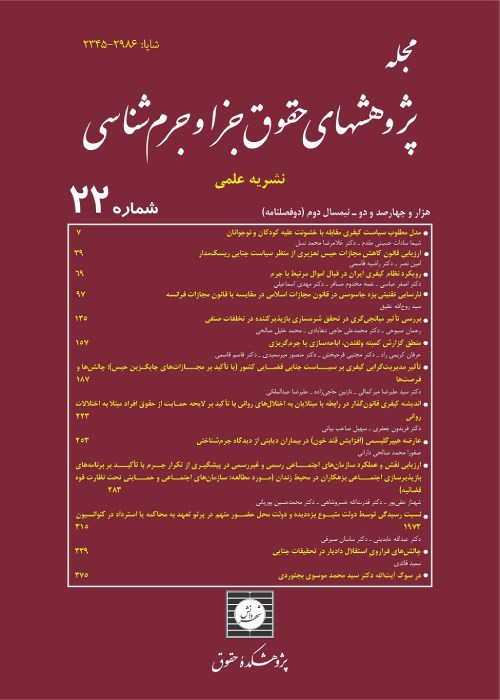Rationality Foundations of Situational Crime Prevention
Author(s):
Article Type:
Research/Original Article (دارای رتبه معتبر)
Abstract:
Background and Objectives
Situational prevention is an approach which, by concentrating on “situation”, considers the environment as being more effective in crime commission from among “human” and “environment”. With this takeaway, “human” assumes a weaker role in situational prevention analyses; however, some perspectives of this kind of prevention, especially perspectives related with “decision-making systems of the potential offender in the face of the crime situation” can implicitly provide insights into his system of rationality, will, passions and instincts. This article is aimed to explore the basics of one of these insights, i.e., situational prevention rationality. This rationality involves certain “philosophical” and “positivist” principles.Methodology
This research is applied in terms of goals and from a methodological point of view, it is based on documents. The research has been conducted by using library studies, internet sources, articles and Persian and English researches. Note taking was used to gather data also.Findings and Results
By invoking to the Hume's philosophy, situational prevention believes passions to direct the potential offender. The potential offender chooses his targets by directing passions by the shortest means possible in the direction of his benefits. Inspired by Bentham and Mill's philosophical perspectives, i.e., attraction of pleasures and avoidance of pains, situational prevention theorists consider the choice of target on the part of the potential offender as a function of the principle of “utility”. From a positivist point of view, situational prevention believes the potential offender to be a function of reward-punishment pattern as it models behaviorist psychology.Sociologically, the cost-benefit model has been introduced as a basis for the potential offender's decision making. Accordingly, the situational rationality system is a nominal/ instrumental rationality which, considering all human's behaviors as “purposeful”, directs rationality towards the “logic of calculus”. This kind of thinking reduces man to an evaluating/ calculating creature. In this system of rationality, values, spirituality and happiness are nonsensical, because goals are mostly determined by passions for gaining short-term material benefits via economic estimates (cost-benefit). This denotes reducing a truth-seeking man (goal-setting criteria) to an effective man (the rationale for determining means).Language:
Persian
Published:
Journal of Criminal Law and Criminology, Volume:6 Issue: 12, 2018
Pages:
31 to 56
magiran.com/p2246890
دانلود و مطالعه متن این مقاله با یکی از روشهای زیر امکان پذیر است:
اشتراک شخصی
با عضویت و پرداخت آنلاین حق اشتراک یکساله به مبلغ 1,390,000ريال میتوانید 70 عنوان مطلب دانلود کنید!
اشتراک سازمانی
به کتابخانه دانشگاه یا محل کار خود پیشنهاد کنید تا اشتراک سازمانی این پایگاه را برای دسترسی نامحدود همه کاربران به متن مطالب تهیه نمایند!
توجه!
- حق عضویت دریافتی صرف حمایت از نشریات عضو و نگهداری، تکمیل و توسعه مگیران میشود.
- پرداخت حق اشتراک و دانلود مقالات اجازه بازنشر آن در سایر رسانههای چاپی و دیجیتال را به کاربر نمیدهد.
In order to view content subscription is required
Personal subscription
Subscribe magiran.com for 70 € euros via PayPal and download 70 articles during a year.
Organization subscription
Please contact us to subscribe your university or library for unlimited access!


